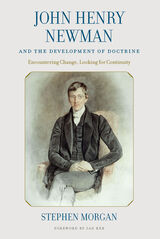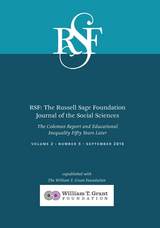2 books by Morgan, Stephen

John Henry Newman and the Development of Doctrine
Encountering Change, Looking for Continuity
Stephen Morgan
Catholic University of America Press, 2022
John Henry Newman and the Development of Doctrine provides an analysis of the attempts by John Henry Newman to account for the historical reality of doctrinal change within Christianity in the light of his lasting conviction that the idea of Christianity is fixed by reference to the dogmatic content of the deposit of faith. It argues that Newman proposed a series of hypotheses to account for the apparent contradiction between change and continuity, that this series begins much earlier than is generally recognized and that the final hypothesis he was to propose, contained in An Essay on the Development of Christian Doctrine, provides a methodology of lasting theological value and contemporary relevance.
Stephen Morgan establishes the centrality of the problem of change and continuity in theology, to Newman's theological work as an Anglican, its part in his conversion to Catholicism and its contemporary relevance to Catholic theology. It also surveys the major secondary literature relating to the question, with particular reference to those works published within the last fifty years. Additionally, Morgan considers the legacy of the Essay as a tool in Newman’s theology and in the work of later theologians, finally suggesting that it may offer a useful methodological contribution to the contemporary Catholic debate about hermeneutical approaches to the Second Vatican Council and post-conciliar developments in doctrine.
[more]

RSF
The Russell Sage Foundation Journal of the Social Sciences: The Coleman Report and Educational Inequality Fifty Years Later
Karl Alexander
Russell Sage Foundation, 2016
The 1966 Equality of Educational Opportunity Report (EEO)—also known as the Coleman Report—is one of the most important education studies of the twentieth century. Commissioned by Congress as part of the 1964 Civil Rights Act, the report revealed pervasive school segregation by race, among other inequalities, and began a national dialogue on educational opportunity for minority children. On the fiftieth anniversary of the EEO report, leading scholars revisit its legacy in this special issue of RSF, edited by Karl Alexander and Stephen Morgan. The contributors examine the report’s methods and conclusions through the lens of social science advances over the past half century, and analyze issues such as school reform, persistent racial segregation, and changing educational standards to provide a thoughtful analysis of barriers to educational opportunity today.
The issue begins with a reassessment of the EEO’s major findings. Karl Alexander analyzes the report’s conclusion that families exert greater influence on children’s school performance than the schools themselves. He finds that family, school, and neighborhood all interact to shape children’s academic development in ways that are not always separable. Other contributors investigate how racial achievement gaps have changed since the report’s release. Sean Reardon finds that disparities in average school poverty rates between white and black students’ schools are the most powerful correlate of achievement gaps. Barbara Schneider and Guan Saw show that while blacks aspire to attend college at greater rates than whites, fewer blacks than whites now attend four-year colleges in part due to lesser access to college preparation activities, such as advanced-level academic courses.
Contributors also evaluate and update the EEO’s proposals to reduce longstanding socioeconomic and racial achievement gaps. Prudence L. Carter argues that effective policies for ending racial disparities must account for inequalities within schools as well as between them. Brian Jacob and coauthors explore whether technological advances since the EEO, including online courses, have the potential to reduce some of the educational inequalities associated with residential segregation. Ruth Turley shows how renewed partnerships between education researchers and policymakers at the local, regional, and national levels can improve disadvantaged students’ educational outcomes and increase racial and economic integration. By looking forward as well as back, this issue of RSF documents what educators and scholars have learned from fifty years of social science research on educational opportunity.
The issue begins with a reassessment of the EEO’s major findings. Karl Alexander analyzes the report’s conclusion that families exert greater influence on children’s school performance than the schools themselves. He finds that family, school, and neighborhood all interact to shape children’s academic development in ways that are not always separable. Other contributors investigate how racial achievement gaps have changed since the report’s release. Sean Reardon finds that disparities in average school poverty rates between white and black students’ schools are the most powerful correlate of achievement gaps. Barbara Schneider and Guan Saw show that while blacks aspire to attend college at greater rates than whites, fewer blacks than whites now attend four-year colleges in part due to lesser access to college preparation activities, such as advanced-level academic courses.
Contributors also evaluate and update the EEO’s proposals to reduce longstanding socioeconomic and racial achievement gaps. Prudence L. Carter argues that effective policies for ending racial disparities must account for inequalities within schools as well as between them. Brian Jacob and coauthors explore whether technological advances since the EEO, including online courses, have the potential to reduce some of the educational inequalities associated with residential segregation. Ruth Turley shows how renewed partnerships between education researchers and policymakers at the local, regional, and national levels can improve disadvantaged students’ educational outcomes and increase racial and economic integration. By looking forward as well as back, this issue of RSF documents what educators and scholars have learned from fifty years of social science research on educational opportunity.
[more]
READERS
Browse our collection.
PUBLISHERS
See BiblioVault's publisher services.
STUDENT SERVICES
Files for college accessibility offices.
UChicago Accessibility Resources
home | accessibility | search | about | contact us
BiblioVault ® 2001 - 2024
The University of Chicago Press









